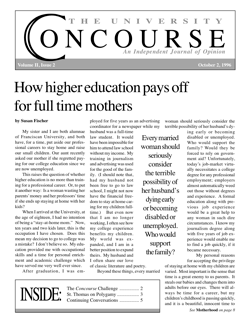More on the curriculum debate
by Mark Fischer
In response to Dr. Crosby’s critique of my defense of the present core requirements, I begin by noting that I did not “plead” for the existing core. It is obvious that some change is necessary, but the question remains as to the nature and extent of such change. While agreeing that the body of core courses ought to be narrowed and more focused, I argued that it should also contain a degree of flexibility, so as to adequately address students with diverse careers, goals and interests.
Undoubtedly, in making my arguments, I was guilty of a measure of caricature. Such caricature was in part motivated by the hyperbole of those arguing for what I perceived as radical change. Comparisons to “Piedmont Virginia Community College” and statements about the lack of “real education” were offensive to me and other alumni who were enriched by our academic experience at the University. Caricature and hyperbole do not facilitate reasoned debate, and I regret my participation in such activity.
As I approach the question of curricular reform, I begin with two basic premises. First, any core should contain encounters with the classics. A plausible way to approach these encounters is through carefully constructed survey courses in which students could be confronted with the fundamental questions of which Dr. Crosby wrote, presented in an introductory fashion that would encourage engagement in these questions by the student. In this way, such classes might inspire further exploration by the student. I believe that some of these classes already exist; indeed, I personally enjoyed taking survey-type courses in philosophy and theology while at the University. In my opinion, the University would do well to create a series of such courses to comprise a portion of the core.
My second premise is that different students have different strengths and abilities. This does not seem a remarkable proposition, and in no way implies a denigration of professional students. (Remember that I myself was a professional student.) I noted these differences among students, and Dr. Crosby compared me to those who engage in the condescending treatment of minority students. Such comparison is seriously misplaced and, I may say, a caricature of my argument. Those who patronize minority students are judging their abilities by the color of their skin. I engaged in no comparable judgment. I only noted that different students bring with them different strengths and different interests and that a single inflexible core of courses cannot adequately address such diverse students.
While Dr. Crosby disavows a great books approach, his colleague Dr. Regis Martin wrote strongly about “sustained encounters with the masters.” Other articles contained lists of these masters. The impression I received (and it may have been a false one) was that many professors were advocating a core dominated by extensive readings of the works of these masters. Such an approach would require non-philosophy, theology and literature majors to grapple with very difficult works from these disciplines. A useful comparison might be a requirement that philosophy, theology and literature majors all grapple with calculus and lab-physics. Indeed, a classical liberal arts education surely contains a difficult regimen of math and science. Yet, I hear no clarion call for physics and calculus—disciplines that develop logic, precision and academic rigor. Instead, our students, if they so choose, may take a survey of physical science and lower level math courses. And this is how it should be.
Similarly, surveys in philosophy and theology should be available for those not pursuing those disciplines. Students can be introduced to the masters in small, manageable doses and, if the teacher does his job, the student will pursue further study on his own. Once again, I do not mean to condescend when I reference “small, manageable doses.” This is how I was introduced to philosophy, and I believe the approach to be effective. However, such survey courses are not the only way to provide a liberal arts education. As I attempted to outline in my prior article, writing courses, political science courses and courses in theological doctrine can be used to expose the student to fundamental ideas great, seminal thinkers throughout history. To repeat an example I used earlier, Mary Ann Sunyoger taught a highly useful and practical course in writing by having us read and analyze excerpts from Plato and Augustine and St. Paul. I still argue that such methodology (along with the survey courses described above) will be more accessible and effective for many students than a core of lengthy, difficult works.
Finally, Dr. Crosby used a statement from my article as an opportunity to dispute with those who believe that a professional program combined with catechism is the best form of Catholic higher education. I can assure Dr. Crosby that I do not hold this view, and that the University faculty, especially its theology department, did a fine job instilling in me a beginning knowledge of “how to interpret (documents of faith) with balance and a sense of proportion.” And this is most certainly a sign of an authentic liberal arts education.
Surely, our curriculum can be made stronger and more focused. I applaud those who have undertaken this enterprise and only caution against our establishing a curriculum that ignores the diversity of vocations within the student body. But to recognize a need for change, one need not disparage what has gone before. We graduates have been immensely blessed—both spiritually and intellectually—by our University experience and by those faculty who provided such experience. It seems to me that fruitful change may only happen if those seeking it begin by acknowledging this reality.
Mark Fischer, Class of ‘89
Mark Fischer is a contributing editor of the Concourse.


